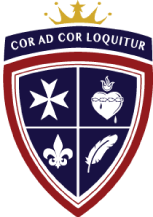“The best that has been thought and said…”
That is how Matthew Arnold, the first chair of English Literature at Oxford University, defined the content of a classical education. By “the best” he did not mean “the most difficult” or even “the oldest,” but rather those works which meet a standard of excellence by addressing the essentially human questions: “Who are we?” “Where did we come from?” “What is the good life and how do we teach it?”
Classical education does not exclude students who are not yet ready to tackle Aristotle or Cicero since it appeals to the qualities inherent in all human beings; not only this, but it includes perennial favorites that span all abilities, triumphant examples of the true, the good, and the beautiful in such stories as “The Ugly Duckling,” The Lion, the Witch, and the Wardrobe, and in the tale of Odysseus. A rich experience of these beautiful and moral stories is an essential, but not complete, classical education.
Through the Lens of the Incarnation
These rich stories unite us with a tradition rooted in three ancient cultures which met at the hinge of history: the Incarnation. Christ and his first disciples had a Hebrew faith, lived under a Roman government, and participated in a distinctly Greek intellectual culture. Luke’s account of the crucifixion tells us that the phrase “This is the King of the Jews” was written above our Lord’s head in Latin, Greek, and Hebrew. From these three cultures spring the essential ideas which characterize the religion, literature, laws, politics, theology, science, and education of the Western world.
Instruction in the literature and language of the ancient world provides students with an opportunity to improve their logical reasoning, expand their vocabulary, gain a foothold into the study of modern language, and, most importantly, understand their place in history. Classical education naturally creates a culture of academic rigor, moral encouragement, religious devotion, and deep understanding of the relationship between faith and culture, all so woefully neglected today.
A Note From a Founding Faculty Member
Dear Friends,
Many classical academies like to emphasize the rigor of their curriculum. Some highlight the benefits to those entering college.
While we believe a classical education does exercise the mind, and while it does prepare students for all types of vocations, we at Sacred Heart think of a curriculum as a course taken by a community of learners as they seek God. The primary motivation for learning should be love—love of the student for the teacher, love of the teacher for the student, and the love of both of them for the material and, most importantly, for God.
“The primary motivation for learning should be love—love of the student for the teacher, love of the teacher for the student, and the love of both of them for the material and, most importantly, for God.”
The secondary effects of such an approach—such as the preparation it gives for one’s vocation—only fully come to fruition when these first motivations are securely locked in place. At Sacred Heart Academy, we strive always to make first things first, and let our programs, curricula, and systems flow from that.
In the end, our course leads wherever we’re truly aiming, and our aim is heaven. I hope you’ll consider joining us on that course.
Zachary Good
Upper School Humanities Coordinator
Sacred Heart is not just a school I just drop my girls off at each day, it is truly a place where you encounter the Beauty of our Catholic heritage, the Truth of the faith, and the Goodness of your neighbor.
Rose D.
Parent
Our children, now young adults (current SHA 11th grade and Hillsdale College Sophomore) recognize and embrace the True, Good and Beautiful in their daily lives. In a world of disillusion, SHA provides the foundation needed to ground children in the Truth, challenging them to Think and Live according to God’s plan.
Christine W.
Parent
The teaching staff have a deep passion for the subjects they teach. They work very hard to provide the best educational and spiritual environment possible!
